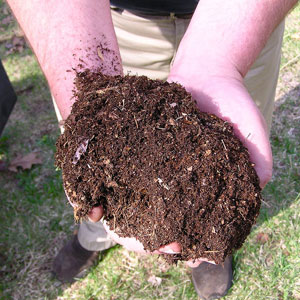Here’s an eye-opening fact: Food scraps comprise one-third of all waste sent to the landfill by Clark County businesses. Dumped in landfills, food waste produces 40 percent of the nation’s methane gas emissions. That’s concerning because methane gas contributes significantly to climate change.
To address this issue locally, the Clark County Public Health Green Business Program is encouraging local businesses to separate food waste for composting.
“Composting food scraps is great because it keeps them out of the landfill,” said Sarah Keirns, Green Business Program coordinator. “Besides reducing methane gas emissions, the resulting compost returns nutrients to the soil, improves soil structure for water retention, and can reduce the need for fertilizers and pesticides. And composting can reduce a business’ waste services bill.”
Currently, a small portion of the food waste generated in Clark County is separated from other waste by local businesses, collected by Waste Connections of Washington, and transported to Dirt Hugger, a composting company in the Columbia River Gorge. There, it is processed and transformed into nutrient-rich compost that is sold to local orchards and some retail stores.
Available to business
The good news is that all businesses in Clark County can compost food scraps through a collection service offered by Waste Connections. Nearly 100 restaurants, offices and other food waste-generating businesses – from the Vancouver Hilton Hotel to The Mighty Bowl – already are collecting food scraps for composting.
The process is straightforward. In offices, employees put food scraps in small bins in break rooms or cafeterias. In restaurants, workers put scraps in containers placed in food prep areas and near bussing stations. The containers are emptied into green carts, which are picked up by Waste Connections.
As businesses launch new recycling and composting programs, Waste Connections is happy to provide ongoing feedback and support to ensure the success of these efforts.
Getting started
Step one: Contact Waste Connections at 360.892.5370 or recyclehelp@wcnx.org to set up the collection service at your site. A waste reduction specialist will work with you and provide information and resources to ensure the new program is successful. Flexible pricing and pick-up schedules can be tailored to your business needs.
Step two: Designate your containers. Set up disposal areas with containers clearly labeled to separate food scraps from garbage and recycling. Waste Connections will pick up the food waste from a cart placed alongside your recycling and garbage containers on the exterior of your building.
Step three: Educate staff. Mixing food scraps with non-food materials can be a big problem, so ensure all employees know what can and can’t be thrown in the food scraps container. Waste Connections will provide trainings and signage to help; in general, “if it grows, it goes,” and “when in doubt, leave it out!”
According to Keirns, the biggest effort is setting up the system. After that, the program is easily integrated into daily operations.
“What we’re hearing from businesses that participate in food waste composting is they find it surprisingly easy to get their employees on board,” she said. “For many employees, there’s a satisfaction that comes from doing the right thing for the environment.”
This Tip of the Week was written by Don Strick, communications manager for Clark County Public Health. To learn more about composting and see which businesses compost, visit the Clark County Green Business website at www.clarkgreenbiz.com/composting. You also can contact Keirns at 360.397.2121 ext. 4300 or sarah.keirns@clark.wa.gov.




